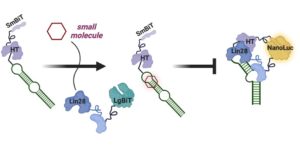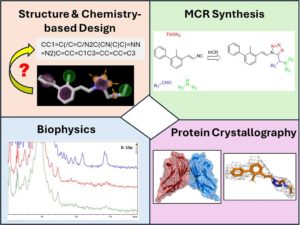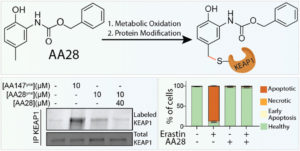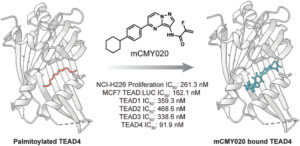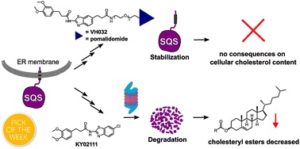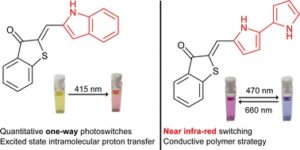RSC Medicinal Chemistry is delighted to introduce our Editor’s choice collection
This collection showcases some of the best articles published in the journal, handpicked by our Associate Editors and Editorial Board members.
Below we have a selection of recent RSC Medicinal Chemistry articles chosen by Associate Editor Sankar Guchhait (National Institute of Pharmaceutical Education and Research (NIPER), India). Take a look at which articles he chose and why.
Sankar Guchhait’s favourite articles
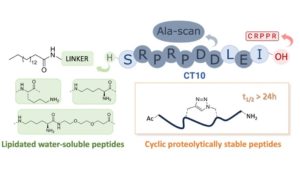 |
Design and synthesis of cyclic lipidated peptides derived from the C-terminus of Cx43 for hemichannel inhibition and cardiac endothelium targeting (Open Access)
Debora Iaculli, Jade Montgomery, Arthur Lamouroux, Anne Caufriez, Rafael Gozalbes, Mathieu Vinken, Filippo Molica, Brenda R. Kwak and Steven Ballet* RSC Med. Chem., 2025, 16, 1289-1303 |
Sankar’s comments:
“The article made a highly significant contribution to the field of cardiovascular disease treatment, with selective inhibitor ligands of Connexins Cx43 HC activity. The work is hypothesis-led research and includes a novel approach, C- and N-terminal modification and cyclization of Cx43 region of protein, new peptides with proteolytic stability and bioavailability, high inhibitory capacity, and a cardiac endothelium targeting strategy. It is a scientifically sound work.”
| Antimicrobial triazinedione inhibitors of the translocase MraY–protein E interaction site: synergistic effects with bacitracin imply a new mechanism of action (Open Access)
Julia A. Fairbairn, Rachel V. Kerr, Nika-Kare A. Pierre-White, Anthony Jacovides, Becca W. A. Baileeves, Phillip J. Stansfeld, Gerhard Bringmann, Andrew T. Merritt and Timothy D. H. Bugg* RSC Med. Chem., 2025, 16, 1641-1653 |
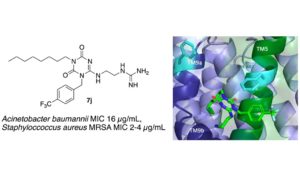 |
Sankar’s comments:
“The work is scientifically highly impressive, considering its exploration of a new mechanism of action, translocase MraY–protein E interaction inhibition, by antimicrobial triazinedione inhibitors. The article presented a novel antibacterial mechanism and discovery of potent peptidomimetics. The work is useful in the field.”
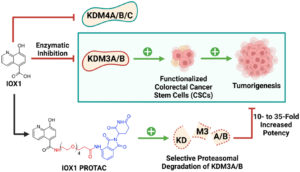 |
Novel PROTAC probes targeting KDM3 degradation to eliminate colorectal cancer stem cells through inhibition of Wnt/β-catenin signaling (Open Access)
Shadid U. Zaman, Piyusha P. Pagare, Hongguang Ma, Rosalie G. Hoyle, Yan Zhang* and Jiong Li* RSC Med. Chem., 2024, 15, 3746-3758 |
Sankar’s comments:
“The article presented a high-quality work in the PROTAC field. The work demonstrated the development of PROTACs from the IOX1 skeleton with structure–activity relationship and structure-based design strategy, a favourable profile of isoform-selective degradation of KDM3 to eliminate colorectal CSCs via suppressing oncogenic Wnt signaling, in vivo efficacy, tumor growth inhibition with around 10- to 35-fold increased potency over IOX1, and metabolic profile and no hERG-associated cardiotoxicity. The studies are focused and impressive.”
Meet the Editor
 |
Sankar Guchhait, RSC Medicinal Chemistry Associate Editor
National Institute of Pharmaceutical Education and Research, India Sankar K. Guchhait is a Professor in the Department of Medicinal Chemistry at NIPER, India. He did his PhD research at the Indian Association for the Cultivation of Science (IACS), Kolkata. Following his postdoctoral research for four years at the University of Tennessee, Knoxville, the University of Illinois at Chicago, and the University of California, Riverside, he started his research and teaching career at NIPER in 2007. His research focuses majorly on medicinal chemistry, anticancer drug discovery, and synthesis of natural product-based and pharmaceutically important heterocyclic compounds. |
We hope you enjoyed reading these articles. Be sure to check out the rest of our Editor’s choice collection, with new articles added regularly.











